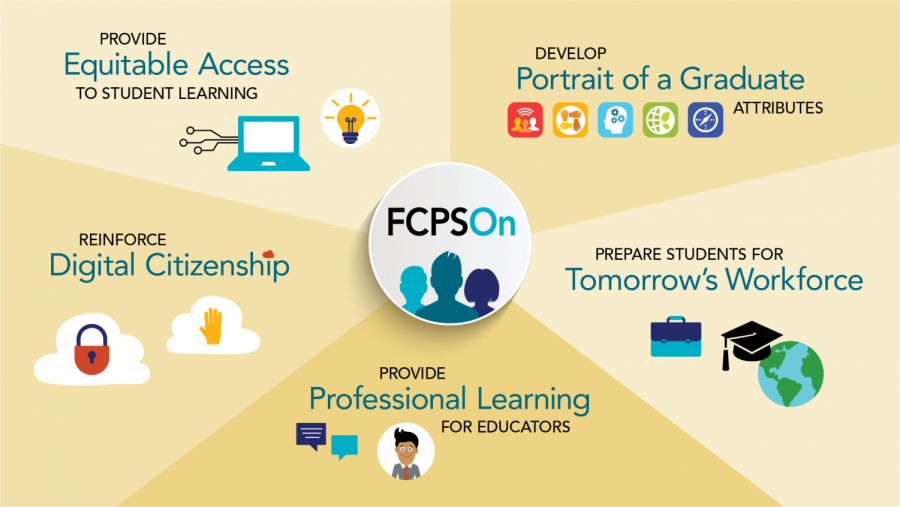WESTFIELD GOES ONE-TO-ONE
Photo courtesy of fcps.edu
FCPS’ graphic displaying various aspects of its FCPSOn initiative
On August 25, over 180,000 students across Fairfax County made their way to school with issued laptops at 198 different campuses. Westfield High School was one of them. Fairfax County Public Schools (FCPS) has now spent over 30 million dollars on school issued laptops.
The one-to-one initiative, known locally as FCPSOn, relates to educational institutions that provide laptops to their students to allow them access to the internet, digital course materials, and digital textbooks. Some Westfield teachers love the new addition, while others have expressed concerns about the costs and potential overuse of technology in the classroom.
Deborah Van Trees, English teacher, commented on how this initiative has impacted her teaching; “The laptops have compelled me to reorient my students’ learning activities. I am trying to have more Google Classroom-ready lessons rather than traditional paper and pen activities.”
Van Trees elaborated on the advantages afforded by the laptops: “Since I use a workshop model to teach English–30 minutes of direct instruction/60 minutes of self-paced… workshop time– students have more flexibility and control over their instructional time. This model allows me to work more directly with students who need help, to conference with students about their writing skills and their progress in class, and to reteach or clarify any material if needed.”
The English teacher added, “As a student I would have loved to have this much control over what I was learning, as well as the ability to take a brief break before moving on to another task.”
Some teachers are less enthusiastic, including a few who take issue with the laptops’ hefty price tag.
Gregg Greentree, Film Studies teacher, had this to say: “All technology can be justified, and it certainly has improved many facets of education, but I worry about the emphasis that is constantly put on it. My students having laptops won’t make me a better teacher. Having fewer students to teach, which would give me a lot more time to address their individual needs or meet with my colleagues to collaborate on innovative new lessons, would make a much more significant difference.”
Last year, Greentree expressed his concerns in a letter to FCPS superintendent, Dr. Scott Braband. Greentree shared portions of that letter with the Watchdog: “What will a kid really use this laptop for that they can’t already do on their phone?… Most anything teachers are doing now to be innovative, like showing video or content links, using online apps or social media for lessons, or even offering up hyper docs, are all accessible by phone. And pretty much every kid already has a phone…”
Greentree also told Braband, “At the rate that technology changes and advances, these laptops will be obsolete before we know it. Look around any school now and you’ll see piles of technology that aren’t used anymore… Those are a lot of dollars that might have been better used.”
The superintendent replied by noting that some students do not own phones or even have internet access. “Equity of opportunity and access to technology is key,” declared Braband.
Charles Gibbs, Social Studies teacher, has raised questions similar to Greentree’s: “What are we giving up in exchange for this huge investment? What about other critical needs in a district that seems perpetually strapped for funding?”
Gibbs also wonders about the legality of charging students an annual maintenance fee of $50: “The Constitution of the Commonwealth of Virginia guarantees that compulsory education, including access to textbooks, is provided at no cost. Will this fee be subject to legal challenge? If successfully challenged, does that mean the county will look again to taxpayers to cover the costs?”
Margaret Sisler, Westfield’s new School Based Technology Specialist, defended the fee by noting its necessity for maintaining the laptops, and hence, protecting students’ access to technology, including school-provided software. She also pointed out that students who have free and reduced status are charged at a reduced rate or not at all, in accordance with their status.
With regard to concerns about overuse, Sisler said, “The goal of FCPSOn is not for students to be on the computer all the time, and we are not planning to replace all instruction with computer time.”
Sisler noted that technology is the best tool for some tasks, while sticky notes and paper-pencil methods still work well for others. What has now changed, she pointed out, is the ready availability of computers.
“In the past, teachers may have wanted to plan an activity using technology, but faced a challenge of reserving carts or taking classes to labs,” she said.
Students have also weighed in on the new laptops. Many are delighted, while others worry about
the burden it places on them.
“I don’t think students are responsible enough to have laptops,” said Anthony Camacho, 9.
Teachers and students alike acknowledge that school issued laptops have been a great help in many ways, though they have also caused problems, as students sometimes forget to charge them, or even leave them at home. In addition the laptops are not invincible; the breaking of a laptop seems more and more evident as the school year goes on.
As with other twenty-first century trends, time will tell whether one-to-one is an asset or liability.





